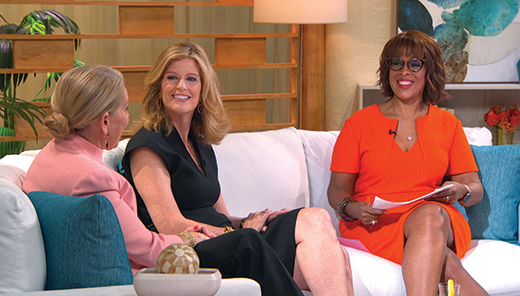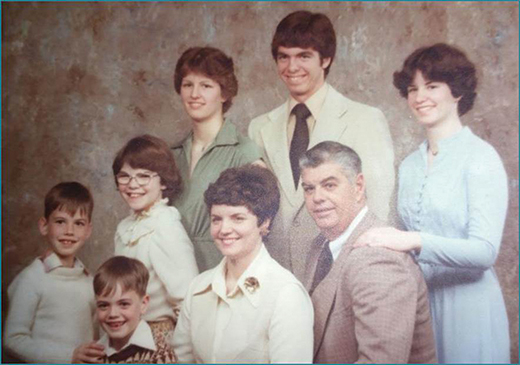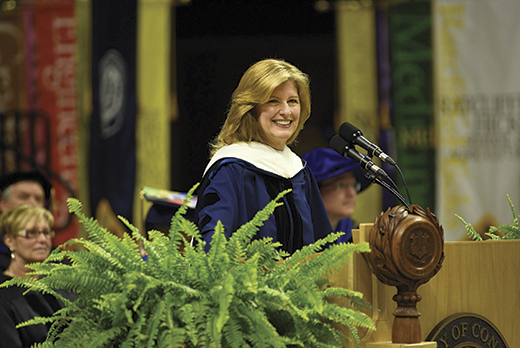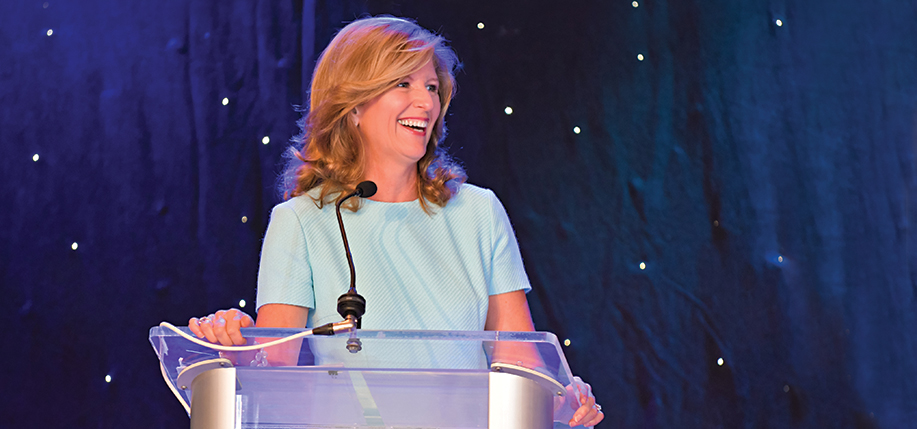Kathleen Murphy shares insights on her career’s success, the importance of team work, and the family story behind her mission to give people, especially women and the younger generation, the tools to secure their financial future.
Kathleen Murphy, one of the top 50 most powerful women in business, doesn’t have an office! And that’s fine with her. “Everyone’s on the same team and there’s no reason for me to have an office,” she says when we talk over the phone, in early September. Her goal is to empower the actual end workers to just go and get things done, once they understand the objective. And the objective is: “Getting the customer what they need in the fastest time possible.” Getting 16,000 workers to realign to a more digitally focused way of working is no small task. “It takes being clear at the senior level about what the strategy is you’re trying to achieve,” Murphy says. Being clear is something Murphy is good at. Her advice to young people entering the job market, especially woman, who are underrepresented in the financial industry, is not to get stuck on the small stuff. “You’ve got a job to do, keep focused on that, don’t get distracted, carry yourself with confidence and in a way that it’s clear what your standards are.”
Born into a family of six children, with loving parents who encouraged hard work and education, Murphy excelled as a student. She graduated summa cum laude with Bachelor of Arts degrees in both economics and political science from Fairfield University and holds a Juris Doctor degree with highest honors from the University of Connecticut School of Law. At 24, she to went to work in the legal department at Aetna, headquartered in Hartford, C.T., and quickly moved up the ladder. By 2000, when Aetna sold its financial services to ING, Murphy was the general counsel and chief compliance officer. Murphy switched from the legal to the business side, and went on to become CEO of ING U.S. Wealth Management. In 2009, she took on another challenge and a move – to Boston, bringing her husband George Hornyak and their son Jack with her – to take over as Fidelity’s president of Personal Investing, which 10 years later she’s grown into an astonishing $2.7 trillion in assets under administration, and more than 19 million client accounts, overseeing 16,000 employees.
“It’s the same basic approach to managing the business whether it’s fifty million, five hundred million, or five trillion,” she tells me when I say the numbers are mind-boggling. And it’s teamwork. “When you win, you win together. It’s not about the individual.” That “team” principle is central to her work and leadership style.
She learned a lot about team spirit through sports – tall, lithe, and fast, she was a natural on the basketball court. And she excelled as a swimmer; her swim team won state finals. Her competitive streak was at least in part fueled by her brothers. Growing up in a traditional Irish-Catholic household, the third of six children, Kathleen and her sisters were expected to do the housework and cooking, while her brothers mowed the lawn, and did outside stuff. That didn’t sit well with “Murph,” as her colleagues often call her. The also tall, red-haired, and high-spirited Jo March in Louisa May Alcott’s Little Women was her hero. And, like Jo, she decided that she could do anything boys could do, just as well. “Just watch me.” (One of the first things Murph did when she moved to Boston was visit Louisa May Alcott’s home in Concord. “You could just feel Jo March there,” she said.) Vince Lombardi was also a hero. Instant Replay, Jerry Kramer’s diary of a season when Vince was coach, a book she borrowed from her older brother, had a big impact. His message of being the best you can be through commitment to excellence struck home. “I throw out Vince Lombardi quotes all the time. In fact, when I moved to Boston and Fidelity, I made him the patron saint of Personal Investing – he’s fundamentally about perfect execution,” she says.

When her father Charlie Murphy died at 57, the experience of watching her mother grapple with financial worries fueled Murphy’s mission to educate women on how to make their money work for them, which is one of the things we discuss in the following interview. On a personal note, I sat beside Kathleen at last year’s Wall Street 50 dinner, and not only is she really smart, she’s really nice; she has an intuitive sense about people. She’s a listener, as you will learn: listening to her customers problems is high on her list of priorities.
Eileen Murray, the co-CEO of Bridgewater Associates, who knows Kathleen through their shared service on the FINRA Board of Governors, put it this way: “Kathy Murphy is a leader who has the unique combination of incredible integrity, smarts, vision,wisdom, empathy, common sense, and a great sense of humor. She’s one of those people who knows what needs to happen and makes things happen.”
The following is an excerpt from our recent interview with Kathleen.
℘℘℘
GROWING UP: I’m the third of six kids. I have three brothers and two sisters. We grew up in a very traditional Irish-Catholic family in Wallingford, Connecticut. I loved being part of a big family. There was a lot of laughter, lots of other kids in our house all the time. And our neighbors were like our cousins, and most of them were Irish too. We didn’t have a lot of money, but we didn’t notice. My mom, a nurse, had taken time off to raise us kids. My dad was a salesman. They drilled into us the importance of faith, family, hard work, and being good people.
My grandfather, who had worked in a factory his whole life, drilled into us that there was a better path forward than that, and that education was the key.
My dad turned down a promotion because we would have had to move, and he didn’t want to uproot us. He put his family first. He used to say: “You guys can fight among yourselves as much as you need to, but as soon as you walk out that door, you support your brothers and sisters.”
INFLUENCES: When I was growing up, I was a huge reader. I just loved Little Women – Jo March was my hero. I read pretty much all the Nancy Drew books, and when I had nothing left to read, I’d go into my older brother’s room, and see what he had.
He had two books that I really connected with. One was Instant Replay, Jerry Kramer’s diary of a season when Vince Lombardi coached the Green Bay Packers. The other was Gale Sayers’s memoir, I Am Third. Gale was a phenomenal athlete who basically said, my faith is first, my family is second, and I am third. My mom was very, very Catholic, and so this notion about doing the right thing, and doing it the right way, struck a chord. Sayers and his Chicago Bears teammate, Brian Piccolo, were the first interracial roommates, and his friendship with Piccolo during Piccolo’s struggle with cancer is part of his memoir, and became the basis for the movie Brian’s Song. Those two books, in addition to Little Women, and the Nancy Drew series, helped shape my approach to life.
Jerry Kramer’s insights into Vince Lombardi especially had an impact. The coach believed that the value of a person’s life is measured by their commitment to excellence and whatever their chosen field of endeavor is, and if you’re going to do something, do it well; your time is really valuable, and make the best use of your time, achieve your God-given potential. Those very fundamental principles influenced everything I did.
TEAM SPORTS: Sports, particularly team sports, were important to my development. I played basketball, and I was a huge swimmer, and our swim team were state champions at high-school level three years in a row. We were a powerhouse swim team, and it wasn’t just about how you did individually, it was: Did enough people do well enough that you won as a group? So sports were important. I learned early that teamwork is important, on the field and in business.

BROTHERS: My father was very traditional and so in our house, the girls did the housekeeping, and the boys mowed the lawn. My sister and I played sports, but my parents were much more focused on my brothers and how they were doing in sports. I tell the story of how my brothers and my father would be out in the family room watching football on a Sunday, and you’d get, “Hey Kat, can you make me a sandwich?” I’m like, “Yeah, alright, I’ll make you a sandwich.” I made the messiest, most awful sandwich imaginable. I wasn’t going to speak out directly, but they were not going to ask me twice.
That division of labor didn’t sit well with me. I would say, “Why can’t I mow the lawn?” I was a bit of a pain about it, but there was motivation that came from having brothers. Like I can do what you can do. And if you think that I can’t, I’m going to prove to you that I can.
CHALLENGING TIME: My dad died of a massive heart attack when he was 57. So that was a big challenge for the whole family. My parents had the traditional division of labor – my mom paid the bills and my dad did the investing. After my dad died, she didn’t know who to turn to, who to trust, or how to manage on her own income with three kids still in college. She had gone back to work, switching careers to work for the phone company. Like most women, she knew how to save, but she didn’t know how to make her money work for her.
Helping my mother through this period gave me a very clear picture of some of the financial challenges people, especially women, face. Women have a very different perspective on why they care about money, and it’s to either help their family or achieve their goals. And they’re quite often, unfortunately, intimidated by the way the financial services industry both talks to them and treats them in the process. I have developed quite a passion for trying to empower women to take control of their futures by taking care of their finances.
EMPOWERING WOMEN: At Fidelity we’ve got a team focused on helping women. We’re breaking down barriers in terms of how approachable the information is that we provide. We continually ask ourselves about the experience that people have with our experts, with our professionals. We’ve hired more women financial advisors – less than twenty percent of financial advisors in the industry overall are women. We’ve had a focused effort over the last several years to hire women at all levels in terms of serving customers, and so now in our branches, across the country, I’m pleased to say that half of the people we have hired in our branches over the last several years are women, which is much better than the industry average.
TAKING IT ON THE ROAD: We have a team focused on helping women of all ages, and separate and related teams working on helping millennials and Gen Z get on the right path early. I’ve done webcasts. I’ve given speeches across the country. I’ll go to the large employers, and frankly we can touch thousands of women at one event. People will check things digitally, but even millennials, at moments that matter in their life, they want to talk to an expert about something as fundamental as their money. And so we’ve got branches across the country, we’ve got literally thousands of people in regional centers across the country to either take calls or meet with them, live and in person, and that can be at the workplace, or at a branch, or at their home, depending on what their preferences are.
PERSONAL APPROACH: I listen to about twenty hours of customer calls every month while I’m driving to and from the office. And I’ve been doing that since my second month on the job, over ten years ago. At first it was just to learn the business and to learn about Fidelity, but over time I’ve used it to see how we can improve the customer experience, and to learn what’s on the minds of our customers. One call that I like to talk about was from a young-sounding guy, who said he’s on long-term disability. It turned out that he was in his forties and he had multiple sclerosis. He had bought a service that we have for providing advice on an ongoing basis called a managed account, and he said, “Look, I’ve got two girls, they’re eleven and twelve, and while I like to look at this stuff and invest, this is way too important to me. I’m counting on you, Fidelity, to get my two daughters through college.” I tell my team: “This is more than just a job. What we do matters a whole lot, and we better take our customers’ issues as personally as they do.”

GUIDEPOSTS: Good attitude, hard work, and curiosity. You may not be the smartest person in the room, but if you put a smile on your face and you want to work with other people, positive energy begets positive energy. So attitude, hard work, and pushing your limits. Those are the three things that are the guideposts for me.
When I came to Fidelity I observed that we could improve on execution. I thought about Vince Lombardi, and how, fundamentally, it was his unbelievable execution that made him such a good coach. I made Vince Lombardi the patron saint of P.I., and I still give out Vince Lombardi quotes all the time to motivate my teams.
THE TRACK TO SUCCESS: I’ve been very fortunate that at every stage of my career there was somebody who took an interest in me, and that helped propel me forward. They didn’t care what your title was or how experienced you were. They were, “Are you going to help or not; do you have a good attitude or not?” I was lucky to work for Zoe Baird. She was the general counsel at Aetna when I was a lawyer there. There was no formal mentorship. She just wanted to get things done. When she saw that people could, she gave them more to do. If somebody has confidence in you, you tend to take more chances, you tend to do more, and I have always benefited from that.
I’m not naive about the biases and challenges that women face. They’re there for sure. But my personal experience was that ultimately what the top leadership cared about was whether you could run the business successfully or not. That grounded me. I’d tell myself, “Alright, you’ve got a job to do, keep focused on that, don’t get distracted, carry yourself with confidence and in a way that it’s clear what your standards are.” It’s the advice that I’d give any young person starting out.
I will say that when I moved on to the general counsel and chief administrative officer role, we had just been bought by ING at the time, one of the ten largest companies in the world. It had a very big global footprint – there were one hundred and fifty thousand people in the company and the top two hundred were invited to a leadership conference every year, usually in Europe. And so I get invited to this conference, and I go, and I’m actually seven months pregnant and I realized that of the top two hundred, just seven of us were women. And I will say that was a wild moment, I was like, “Whoa!”
THE FUTURE: Having inclusion and diversity of thought, and really embracing that, is the future. There’s a huge challenge in that more than half of college and postgraduate degrees are earned by women and yet less than twenty-five percent of the financial services industry is made up of women. And that has nothing to do with the underlying intellectual capability. It’s all about confidence. Research shows that girls in fourth grade think they can do everything that boys can do, and basically they’re at the same level; they like math, they’re good at math, etc. By the time they get into high school almost all of those indicators drop in half. What’s that about? And then when women progress into college, disproportionately, they pick careers outside of some of those categories, that are fundamental to science and math, and that’s a big problem. Because whether it’s financial services or technology or digital capabilities, a lot of our jobs going forward are going to be in those fields.
THE SWITCH: I started out on the legal track, and I was a lawyer for a long time. Periodically, people would ask me, “Do you want to go over to the business side?” I always answered: “If the right opportunity comes along.” My boss at ING came to me one day and said, “It’s time.” He talked to me about a specific set of responsibilities, and I dove in! Having been the general counsel, I had a pretty good sense of what the business was.
My boss said to a guy who reported to me in the law department, “Hey, what do you think of Murph getting this big business job, and you know, five hundred million dollars in earnings, do you think she can do it?” And this guy said, “Murph’s going be just fine. After the first zero it’s just numbers. It’s the same basic approach to managing the business whether it’s fifty million, five hundred million, or five trillion.”
That’s always stuck with me. The fundamentals of business don’t change.

GIVING UP THE OFFICE: My business is an early adopter, particularly in the financial services industry, of having a much more digitally focused way of working. So there’s agile technology, but this is actually running a full business with an agile mindset. There are lots of details about that, but one of the fundamentals of it is basically being clear at the senior level about what the strategy is you’re trying to achieve and getting rid of lots of layers of management in order to empower the actual end workers to just go get things done, once they understand the objective you’re trying to achieve.
So we’ve gone through a massive transformation in my business. I have over sixteen thousand employees to realign to how we do the work in a way that will get it done much faster and be much more in line with what the end customer really wants. As part of that, we really try to challenge conventional wisdom on layers of management and bureaucracy and corporate policies. Everyone’s on the same team and there’s no reason for me to have an office. No one in my business, except for clients facing people, doing financial plans, has an office. We don’t have offices anymore because it’s all about collaborating together in teams. I gave up my office several years ago. I figured that I have to role model in changing behavior in order to really make the point that this is a big transformation, that the ship has sailed; we are working differently now.
WHAT MAKES IT SPECIAL: Fidelity is a private company that was founded by the Johnson family. Abby is the third generation of Johnsons to lead the company, and I think the commonality between those three leaders of Fidelity, over almost seventy-five years, has been to challenge conventional wisdom and put the clients before the firm. We, by far, have the largest market share in the 401K business, and we are the largest retirement provider in the country, and that is because Ned Johnson, and more recently, Abby Johnson, the third generation to lead the company, basically said, “always challenge yourself about how you can add more value to the client.”
The one thing that you consistently get yelled at about at Fidelity is if you’re operating margins are too high, because that would suggest that you’re not investing enough in the client or you’re not investing enough in the long-term vision of the business. Fidelity was one of the early companies to adopt new technologies in a massive way, which allowed them to provide more value back to the clients in terms of lower prices. So, Fidelity is about putting the client first and then challenging the way the industry does things to provide differentiated value. I think the fact that they’re a private company and they’ve been able to achieve all this is not an accident. We have about forty-six thousand employees who take the most pride in our ability to put the customer first. It is a very energizing way to work.
ZERO-FEE FUNDS: It’s another example of Fidelity thinking differently. There were two efforts that were led by my business – Personal Investing. Last year, we introduced, for the first time in the industry, zero-fee mutual funds, and we got rid of all minimums or any product or service that we have. Then this year, we changed the way we’re going to help people make money on the cash that’s sitting in their account that is not invested. A lot of people have a ton of money sitting in their cash account; it shouldn’t be earning nothing. We are basically giving people ten times the investment rate that Schwab does, and that’s very true to Fidelity’s heritage.
HERITAGE: I’ve been to Ireland many times. We’ve done a lot of work with University College Cork. At Fidelity, we’ve recruited a lot of folks from there. I have had two recent trips back because, one, they gave me an honorary degree. My father’s family was all from Cork, I was like, “Oh my God, if my father was still alive.” They then asked me to be on the selection committee to pick the new president of that university, so I spent some time over there interviewing those candidates. It was a whole lot of fun, being the only American in the room.
THANK YOU: To quote Eileen Murray – “Ireland and America should be proud to call this special person ‘daughter.’” We are! ♦


Leave a Reply